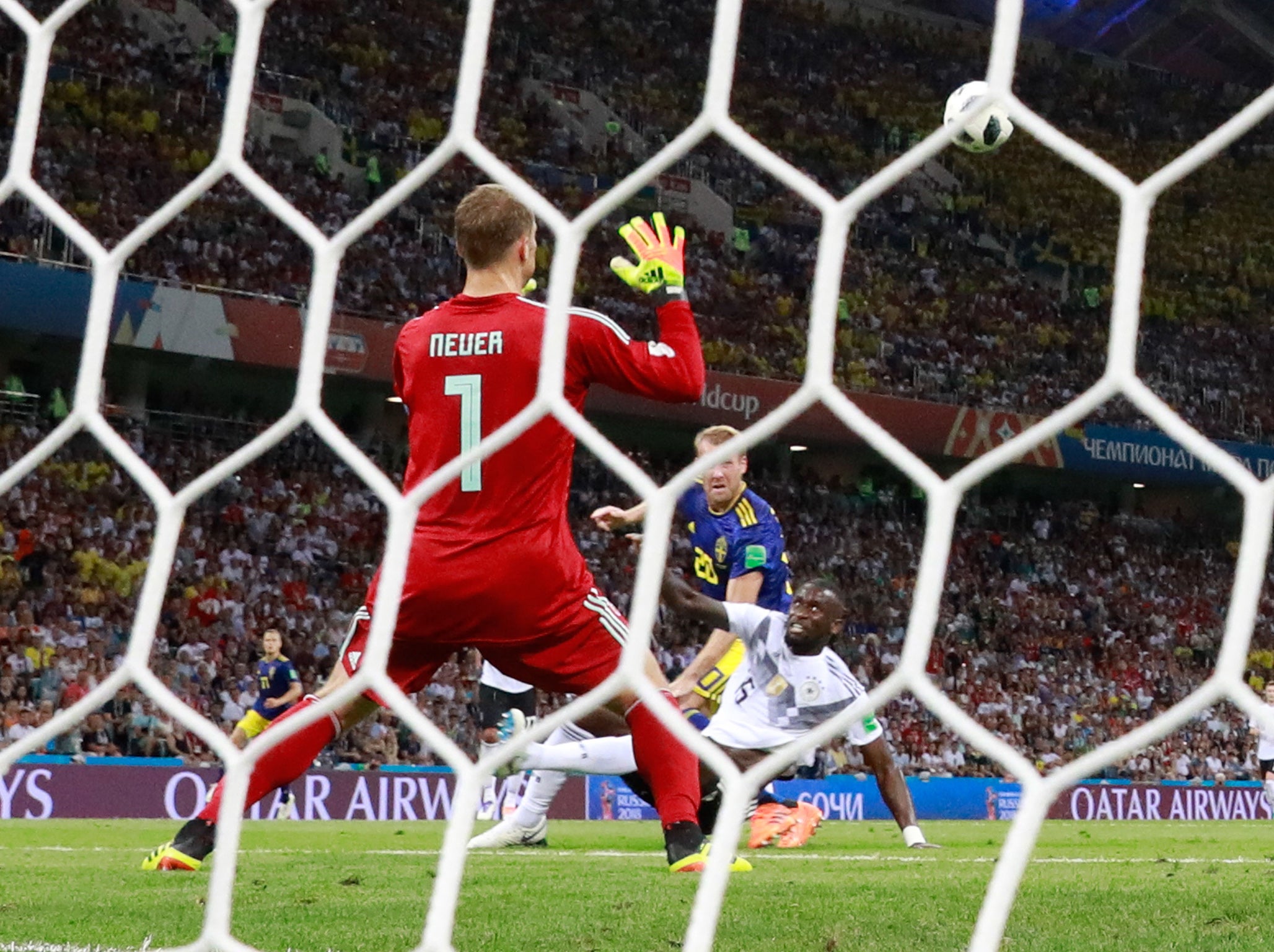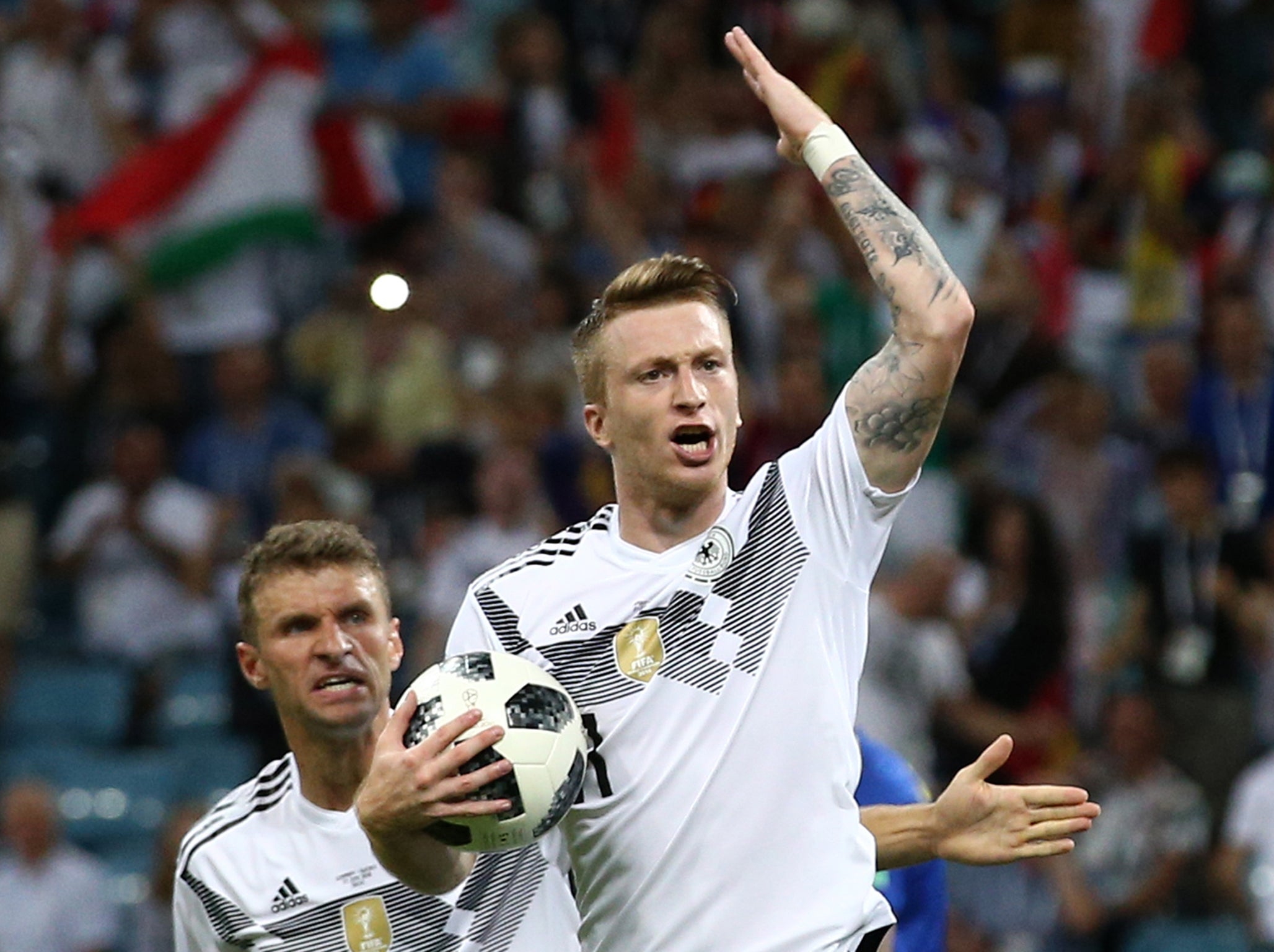Germany vs Sweden, World Cup 2018: Toni Kroos goal pulls reigning world champions back from the brink
Germany 2-1 Sweden: Until his superb late free-kick, it had appeared as though the World Cup would see its holders eliminated at the group stage for the third consecutive tournament
You know how the cliché goes by now. “Football is a simple game”, and especially - it turns out - if you play for Janne Andersson’s Sweden, dutifully chasing hopeful direct passes and picking up scraps from an honest and willing target man. You harry and hassle, you drop off and defend. You are one of 22 men running around chasing a ball for 90 minutes in a simple but effective manner. On the whole, you play well. And yet, in the end, Germany Football still win.
Until Toni Kroos’ spectacular late free-kick had arced around Sweden’s goalkeeper Robin Olsen and into the top-right hand corner, it appeared as though the World Cup would see its holders eliminated at the group stage for the third consecutive tournament. A 1-1 draw would have left Germany with much to do in their final Group F game against South Korea.
The victory does not mean that Die Mannschaft’s work is done, either. They, this devastated Swedish side and Mexico could all yet end on six points each, with qualification settled by goal difference or results between the three. Germany, though, have a chance. They are part of this World Cup again having seemed for so long to be leaving it.
When Ola Toivonen superbly lobbed Manuel Neuer shortly after the half-hour mark to put Sweden ahead, the world champions were being written. Yet an equaliser from the boot of Marco Reus followed shortly after half-time and from there, Germany laid siege. Even when Jerome Boateng’s red card reduced their numbers, they pushed on, knowing a draw was almost as good as a defeat.
Olsen coped well, beating away each attempt right up until the very last - a free-kick too wicked to keep out. Kroos was one of those doubted after last weekend’s defeat to Mexico last week, and partly at fault for Toivonen opening the scoring, but by the final whistle all was forgiven.
The Swedish, meanwhile, were incensed by the celebrations Kroos’ strike provoked from the German bench. Video footage later appeared to show two German officials goading their opponents. Low denied all knowledge of ‘gestures’ or attempts to mock Sweden. He and his staff were, he claimed, simply “elated” with the victory after a such challenging week.
The manner of the defeat to Mexico demanded changes and Germany made four, but the two unrelated to injury were the most striking. Mesut Ozil - ineffective last weekend - and Sami Khedira - overran in midfield that day - were available for selection but both would watch the entirety of this match from the substitutes’ bench.
For all Löw’s talk of “deep trust” in his players a day earlier, these two decisions appeared to be the opening words in this final chapter for the Leistungszentrum generation - the first talents produced by Germany’s revolution in youth coaching in the early 2000s, who eventually broke through eight years ago in South Africa.
Özil, now 29, and Khedira, 31, have been mainstays in Die Mannschaft ever since. The Arsenal playmaker’s absence was particularly symbolic. Özil had started the last 26 tournament games for Germany - a run dating back to his competitive debut in their opening game of the 2010 World Cup.
In his place came Reus. Khedira, meanwhile, was replaced by Sebastian Rudy - a less elegant player, but a more natural fit in a pure holding midfield role. It was a concession that the midfield battle had been lost against Mexico and that here, it had to be won.

In the very early stages, Low’s plan was working. His players’ pride was clearly still stung and they sought to put memories of last Sunday to rest early. Julian Draxler should have done just that with no more than four minutes on the clock, but his attempt was somehow blocked from six yards out.
Germany pressed on with the controlled possession play that until now has served them so well under Löw. By the 10th-minute mark, Die Mannschaft had wracked up 119 successful passes, mostly in the final third. Their opponents, by comparison, had completed six. Andersson has drilled this Sweden side so effectively, however, that one pass can be enough.
Two minutes later, Viktor Claesson almost found it, slipping Marcus Berg through one-on-one with ease. The Al Ain striker managed to stay a yard ahead of Jerome Boateng on his dash towards goal right until he prepared to shoot, when he felt a sudden jolt in the back. Neuer smothered the shot and Berg’s penalty appeals were ignored - by both the referee and VAR.
Though indignant, Sweden had at least exploited Germany now and became confident of doing so again. When Kroos uncharacteristically and carelessly ceded possession, Claesson was ready again. It was his cross that Toivonen expertly brought down with his first touch. The striker’s second was the exquisite finish over Neuer’s head to establish a lead.

It was a half that taught Löw and his players the value of uncomplicated and sometimes ugly football. Germany’s equaliser, three minutes after play re-started, followed suit. Reus did not need to apply the surest touch to Timo Werner’s cut-back from the byline. Anything would do. The bundled finish had just enough on it to pass Olsen.
The remainder was relentless, with Germany intent on finding a winner, but having simply watched the equaliser beat him, Olsen later offered much more resistance. If not for his quick reactions, Victor Lindelof, the Manchester United defender, would have spectacularly converted into his own net.
If their decisive goal was to come, Germany would have to find it with just 10 men. Boateng received a second yellow for a late challenge on Berg, but only after a long delay by referee Szymon Marciniak that suggested the centre-half had escaped punishment. Yet the goal did come with barely any time remaining, with barely any hope left. Jimmy Durmaz’s foul on Werner wide-right was careless. Kroos, after Reus’ neat lay-off, made sure it was costly too.
Join our commenting forum
Join thought-provoking conversations, follow other Independent readers and see their replies
Comments